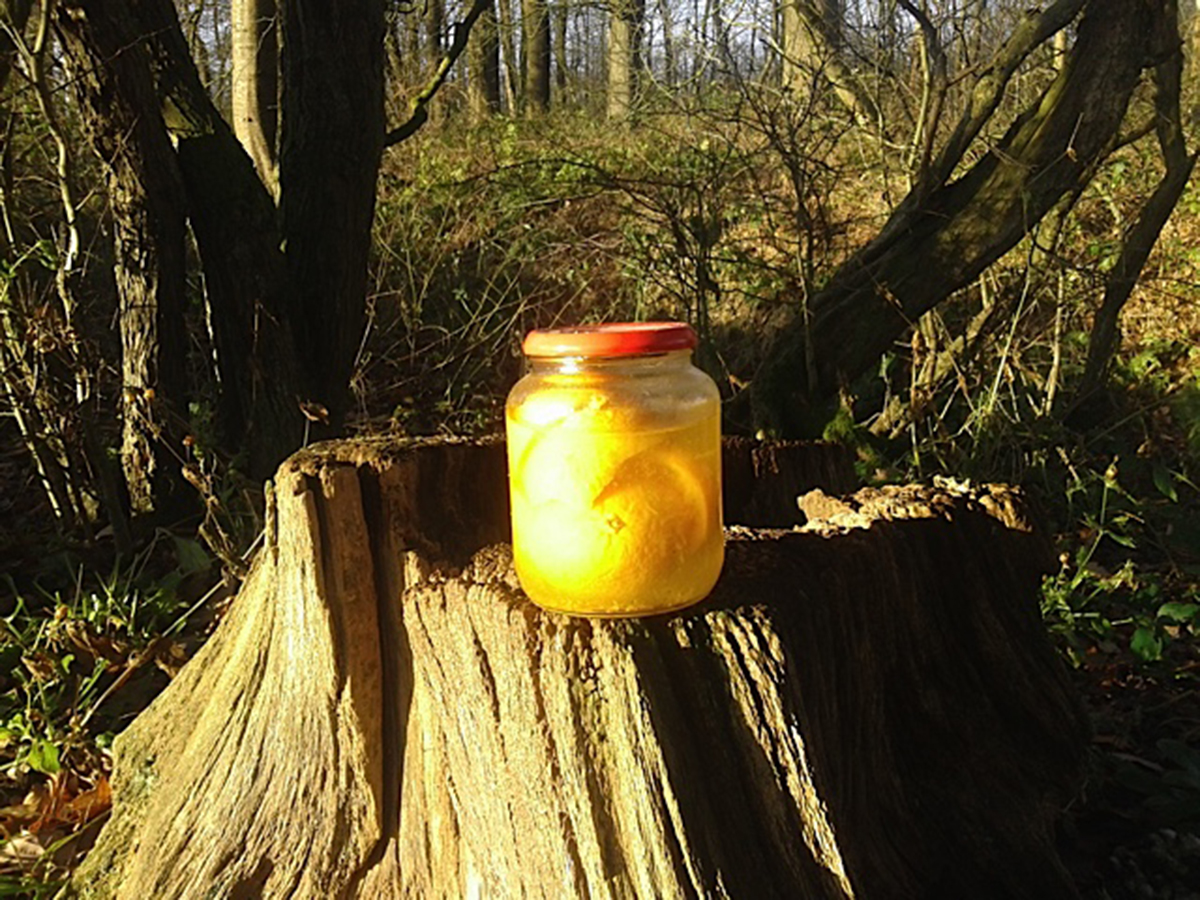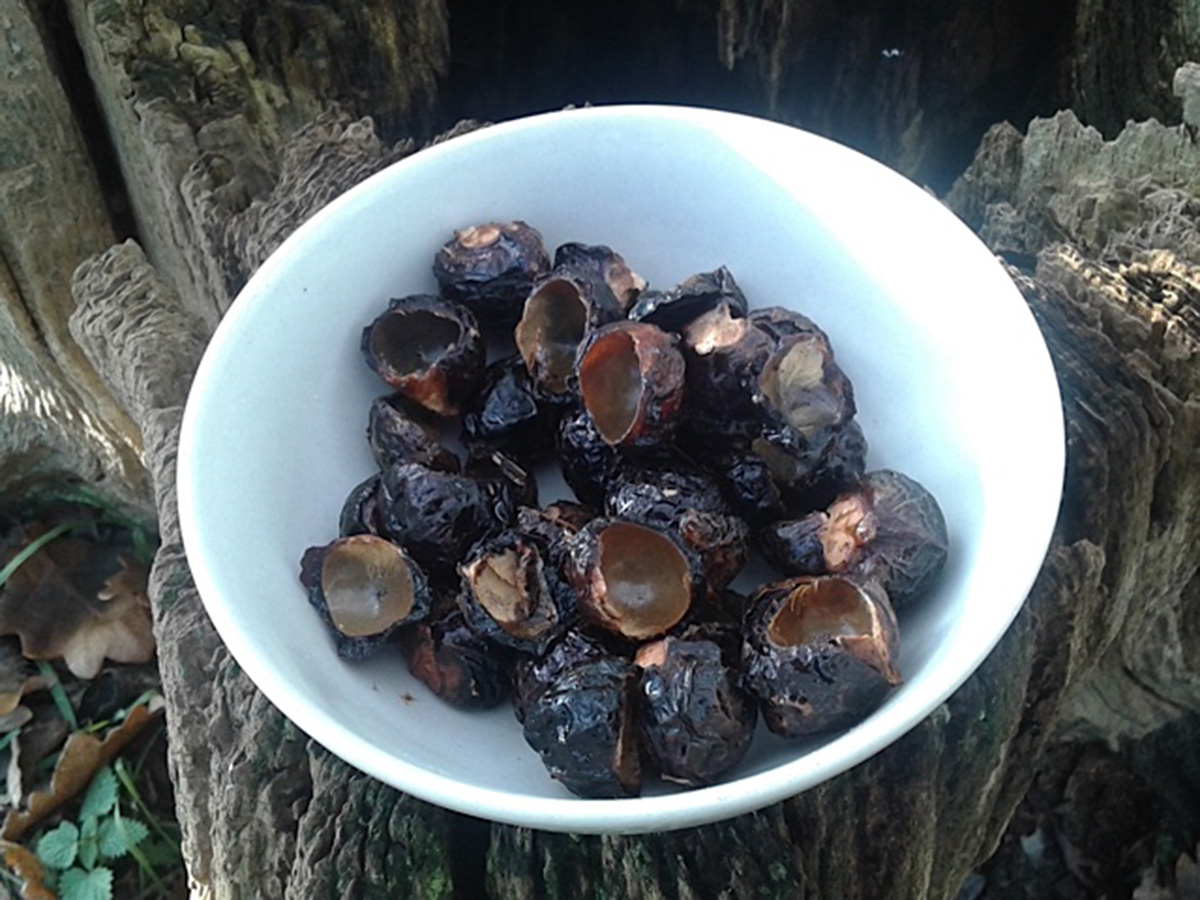Do you want to be gentle to your wallet, your body and the environment? You'll be amazed how much you can achieve by using materials that are probably already in your pantry.

Orange Cleaner
A few years ago, I came across a lovely product called "Orange Cleaner", which was sold on a website for natural products. It was an all-natural, multi-purpose cleaner that I really loved. The smell lingered for days, giving you the impression the house really was clean and fresh as soon as you walked in. Unfortunately, it was a bit pricey. I decided to make my own instead.
The orange cleaner I make these days is really quite simple: the only ingredients are vinegar and orange peels. If you tend to drink freshly squeezed orange juice anyway, you have nothing to lose by giving this product a go. First of all, you have to get hold of a large glass jar with a lid. You fill the jar up with orange peels. Go nearly to the top. Then add the cheapest vinegar you can get, either alcohol-based or natural vinegar. The best thing is to add a non-porous, quite heavy stone into the top to keep your peels down. Leave your concoction to brew for about two weeks, though a bit longer is fine if you prefer.
The advantages? It's cheap, smells good, and isn't toxic to children or anyone else. While it may not taste like much, drinking it wouldn't be fatal by any stretch of the imagination. This product is also completely biodegradable, so you're not harming nature. I've used it for around a year now and I love the results. I clean my floors, bathroom, windows, and surfaces with it and I can assure you my house doesn't look like a dump.
Cream Of Tartar
Cream of Tartar, officially known as potassium bitartrate or KC4H5O6, can be used to remove stains, and to clean your kitchenware and toilet. Often used in combination with baking soda. If you are an avid wool dyer like me, you'll have this stuff around the house anyway. If you're not, it's not expensive.
To remove stains, mix a little cream of tartar with three percent hydrogen peroxide and dab the resulting paste right onto your stain. Once you wash your garment, the stain should be gone. A paste of vinegar and cream of tartar can be used to clean your kitchenware as well as any metal ornaments you may have.
See Also: Body Fats: Their Role In Health And Disease
You can remove the mineral stains from your bathroom sink, bath and toilet by making a mixture of a cup of vinegar and a cup of cream of tartar. Use a scratchy sponge to scrub the target area, and voila. Wipe the surface with clean, dry cloth... unless you were cleaning the toilet of course.
Natural Laundry Detergent And Deodorant
Soap Nuts
Soap nuts are another wonderful and natural way to keep your house and body clean. Different species of soap nut come from South-East Asia and America. They have been used as a "washing liquid" for thousands of years, and have recently started gaining popularity among modern folks. They actually create a soap-like substance that foams when soaked in water. These little fellows have a few different applications — they can be turned into a washing detergent, cleaning agent and shampoo for yourself as well as your pets.

To use soap nuts as a washing detergent, first place three to four nuts into a little bag. You can use one of those bags meant to put bras in, or designate a sock as a washing bag instead. In the latter, you'll have to tie the sock. Then, proceed to use the washing machine as usual. The good thing about using soap nuts to do your laundry is that it keeps your clothes nice and soft. It also smells pretty good. However, you can also add some lavender essential oil to your soft rinse compartment.
Caution: soap nuts work well for gently soiled clothes, but you don't want to use them on your white washing. It would turn brown. Don't ask me how I know. Grease stains also require more aggressive treatment, so you can pre-treat them with laundry soap instead.
To use soap nuts as a house cleaner, simply boil about a cup of them in a medium saucepan full of water. Mash the nuts with a potato masher while you are boiling the mixture. Let your mixture stand until the water has cooled down, remove the soap nuts, and place the liquid into a bottle. You can use the mashed soap nuts as a snail detergent in your garden.
You can use the mixture as a house cleaner, but an alternative is to wash your hair with it. I haven't personally had much luck with that, but some people swear by it. Do you have a cat or dog that needs washing occasionally? Once again, soap nut shampoo provides a non-toxic and cheap means towards getting your pet clean. There's no guarantee they'll enjoy the bath, though.
Natural Deodorant
All that cleaning will have made you sweaty and stinky! You'll need a nice deodorant to apply to your underarms after you've had a shower. There are several ways of making your own, completely natural deodorant for hardly any money.
What you can do is take two tablespoons of baking soda, two tablespoons of cornflour, and two tablespoons of coconut oil. Add a few drops of an essential oil of your choice — sage, lemon, tea tree and lavender are all excellent choices. To prepare it, you have to heat up the coconut oil so it's in liquid form. Stir in the cornflour, and afterwards the baking soda and your essential oil. The mixture will go hard again, and you can apply it with a little spatula.
See Also: Bacteria In Wine May Bring Health Benefits
The other possibility is to use a little alum. Dissolve that in water and add essential oil. Then you shake it and put it in an old deodorant roller. It works like a dream. It really does.
- Photo by Anna Schaap/SteadyHealth.com
- Photo by Anna Schaap/SteadyHealth.com


Your thoughts on this